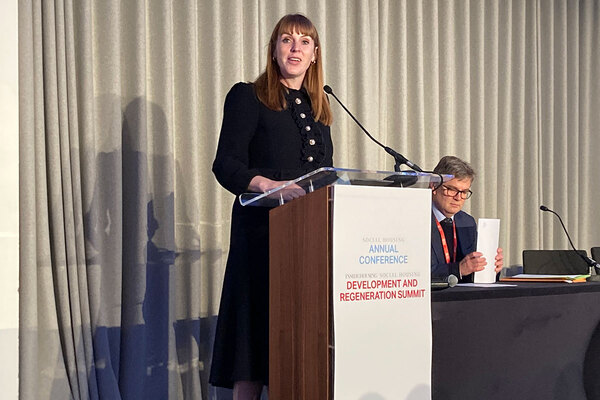Collapse in London affordable housing starts fuels 39% national decrease
The number of affordable housing starts in England during 2023-24 fell 39% on the previous year, according to the latest government release.

The fall from 71,771 to 43,439 starts across all ‘affordable’ tenures – the lowest on record since 2016-17 – was fuelled by an 88% decrease in London.
In the capital, there were just 3,156 starts for the 2023-24 financial year, compared with 26,386 during the previous year, the data from the Ministry of Housing, Communities and Local Government (MHCLG) showed.
Another recent England-wide data release from MHCLG showed the largest fall in housing association starts year-on-year since records began in 1978. This was also most acute in London, where starts fell 92% year-on-year.
Last month, figures published by the Greater London Authority (GLA) revealed that just 582 grant-funded affordable homes were started during the first half on 2024-25.
In May, mayor of London Sadiq Khan called for an emergency £2.2bn stimulus for housebuilding in the city, as its own figures revealed a 90% collapse in starts for 2023-24.
At the end of September, deputy prime minister and housing secretary Angela Rayner scrapped a review of the London Plan ordered by the previous Conservative government, with the hope of starting a “new partnership approach” on housebuilding.
Within the newly released national starts total, 7,575 homes were for social rent, with 8,506 for affordable rent and 414 for intermediate rent. London Affordable Rent made up just nine starts – down from 11,588 the previous year.
Shared ownership accounted for 5,768 of the national starts, while 20,237 were recorded as an unknown tenure.
The number of starts contrasted with the number of affordable homes completed for 2023-24 – 62,289 – which fell only 2% compared with the previous year and was the second-highest total since 2014-15.
Andy Hulme, the chief executive of housing association Hyde, which operates in London and the South East, said the sharp fall in affordable housing starts should be “concerning for everyone” at a time when record numbers of homeless children are living in temporary accommodation.
“It is fair to say that England is now in the grips of a national housing emergency,” Mr Hulme said. “Unfortunately, [the drop in starts] will lead to more people becoming homeless in the coming months and years, as less affordable housing is delivered at a time when demand is increasing.”
He explained that the drop-off in the supply of housing for social rent over the past three decades, accelerated by post-2010 grant cuts, was the “most acute” part of the problem.
“Solving an emergency situation is not possible with business-as-usual solutions,” Mr Hulme said. “To solve the housing emergency, we have to make social housing financially sustainable to build and maintain again.”
The Hyde boss welcomed comments made a few days ago by Ms Rayner at the Social Housing Annual Conference in London.
In her address, the deputy prime minister said she was pushing her cabinet colleagues for rent convergence and other measures that can help the housing association sector contribute to the Labour government’s 1.5 million new homes target.
“We’re excited about this government’s ambitions to tackle the housing crisis,” Mr Hulme said. “Delivering a long-term rent settlement will enable us to attract more private investment into affordable housing.”
In response to the latest figures, an MHCLG spokesperson said: “These statistics emphasise the scale of the housing crisis we have inherited. We will fix this by delivering the biggest increase in social and affordable housing in a generation.
“We will also make changes to the planning system, restore mandatory housing targets for councils, and we have boosted the Affordable Homes Programme by £500m.
“Everywhere must play its part to bring the housing crisis to an end and we will work in close partnership with the mayor to radically boost housebuilding in the capital and build the homes that London needs.”
A spokesperson for the mayor of London said that a “disastrous inheritance from the previous government has left national housebuilding on its knees, with developers previously predicting housebuilding could fall to the lowest level since the Second World War”.
They added: “While the impact of this legacy is being felt most acutely in London, it is apparent across the country, with the Office for Budget Responsibility projecting housing completions will fall this year and next.
“Despite this, thousands of affordable homes are still being built across London, with the mayor’s success on affordable housing meaning the capital is well placed to carry on building homes, even during this incredibly tough period.
“Under his tenure the mayor has started more new council homes than any time since the 1970s, and Sadiq will continue to work hand-in-hand with the new government to turn the tide on the last 14 years of underinvestment in housebuilding, helping to create a better, fairer London for everyone.”
Sign up for our development and finance newsletter
Already have an account? Click here to manage your newsletters











